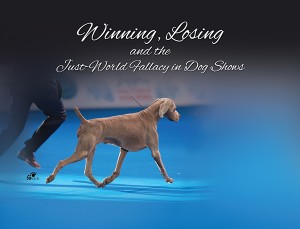Winning, Losing and the Just-World Fallacy in Dog Shows
Click here to read the complete article
Are dog shows fair? Is judging fair? Do dogs that win do so because they’re the best ones in the ring? Ask two populations of people in the dog show world and you’ll get two very different answers.
If you ask the elite and glitterati of the dog show world–the backers, the top handlers, the celebrity judges–they’ll tend to tell you that reports of politics are way overblown, that judges do their best to just judge the dogs, and that other people complain because they just don’t have good dogs, haven’t paid their dues and aren’t being realistic. The top dogs are promoted by the wealthy and shown by top handlers because that’s what dogs of that caliber deserve in order to be seen by the fancy and to advance their breed. These dogs win because judges have a good eye for dogs and overall are honest and consistently able to find exemplary specimens.
If you ask the typical owner handler, or even the aspiring new handler, you’ll hear instead that most judges look more at faces than at dogs, that money and advertising are more important than the standard when it comes to winning, and the whole mess is so political they don’t know why they continue. Those in the middle compromise, saying judging isn’t as political as many think, at least not at the class or breed level (where they win their fair share), but it is at the group and especially the BIS level.
And not a single person is lying.
All of these people, every one of us, is influenced by a psychological principle called the just-world fallacy. Basically the just-world fallacy (or just-world hypothesis) says that people tend to think the world is a just place, but that attitude differs according to whether you’re thinking about yourself or about others, and whether things are going well or going poorly. Let’s talk about how this affects our attitude toward others.
Click here to read the complete article

Short URL: http://caninechronicle.com/?p=179890
Comments are closed












